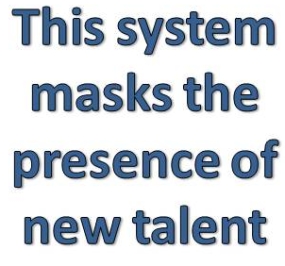
By Bill Starlin
In the 21st century, media is controlled by a steadily decreasing number of interests and outlets. They are generally publically held multinational conglomerates that control many layers of media from print, to television, to movie houses, to the internet. The question we must ask ourselves is at what point does this multimedia pervasiveness begin to feed on itself and generate headlines and stories that serve to further its self interest rather than the public good? Where do checks and balances manifest in a system where readers are constantly exposed?
This overarching question is even more pronounced in Hip-Hop media. While there are pockets of discontent with the current state of artistic affairs, Hip-Hop journalism has been fundamentally weakened by many of its sources of revenue: mainly labels and retailers.
Make no mistake that media is a business. Many times the editorial component runs into direct opposition from sales and marketing within the confines of a company’s structure, creating a tenuous walk between objective coverage of Hip-Hop culture and soft-ball non confrontational popcorn representation that is neither groundbreaking, breathtaking, or by any means challenging.
Hip-Hop presently occupies a landscape at least domestically, in search of a consistent fan base. Part of that search is not only defining who its listeners are, but being able to educate them and introduce them to the idea of talent renewal; that as their favorites begin to lose steam, there will always be someone viable to pick up that slack and replenish the pool. 
Currently the dissemination of that new talent is being railroaded by an antiquated parasitic radio/label structure that preys on the innocence and ignorance of new artists, perpetuates themes and styles until they are run into obsolescence, and forces tastes on consumers through repetition. This system masks the presence of new talent and prevents the spotlight from being cast on new product.
Hip-Hop media supports this system by contributing to the masquerade. Before the internet, when the only access to artists and their lives were monthly magazines and video/radio shows, fans were at the mercy of the outlets in having a pool of talent to choose from. Regionally the streets carried numerous movements from the grassroots to the business suits, but if your community lacked that mixtape/artist breaking infrastructure, you as a consumer were a slave to the radio rhythm.
With the advent of the internet, that separation is all but removed, and consumers are no longer subject to the tastes of radio. At issue is consumer willingness to search for new talent. That need for satiation is presently being filled by websites. The main engine for their financial survival is marketing dollars from labels and peripheral businesses. Because of the controversial content, traditional advertisers with mainstream name recognition tend to shy away from Hip-Hop sites, despite their larger numbers because they don’t want to identify their brand with Hip-Hop in fear of alienating its main consumer support.
The result is two-fold. We have sites that avoid most aspects of journalism altogether. They post images and songs and allow a fan free-for-all. While they are great for simply disseminating new music and getting product and exposure for all artists, they lack the kind of critical analysis that some readers look for in making their consumption choices or in general getting real information.
On the other side, there are sites that feign journalism, but deliver fluff for fear of alienating artists and their management. These sites have interviews that don’t offer any insight, and diminish artists as people, reducing them to commodities whose worth is solely based on their last hit. Albums are reviewed without objective, supported analysis, which is easy to understand when you scroll up and see a huge banner for an artist’s album. Running music related ads doesn’t necessarily dilute editorial credibility by any means, but there is a level of advertorial content involved in many of these sites, which detracts from the overall integrity by blurring the line between information and promotion.
Readers are the ultimate judges of a media’s worthiness. There is a myriad of sites and places that carry music and related news. Unlike Fox, CBS or any other business conglomerate, Hip-Hop media operates on a much closer plane to its customers. When readers are unhappy, and have other options, the sites have to respond or risk losing market share in an arena that is increasingly harder to satisfy. Rather than patronizing out of habit or familiarity, perhaps users should go wherever their needs are met. Sounds simple, but that small change would be sure to address the needs of the end user and help the people get what they want.
Good Day and Good Luck
-Bill
Follow us on Twitter @ http://twitter.com/planetill
Bill Starlin May be reached @ BillStarlin@yahoo.com




